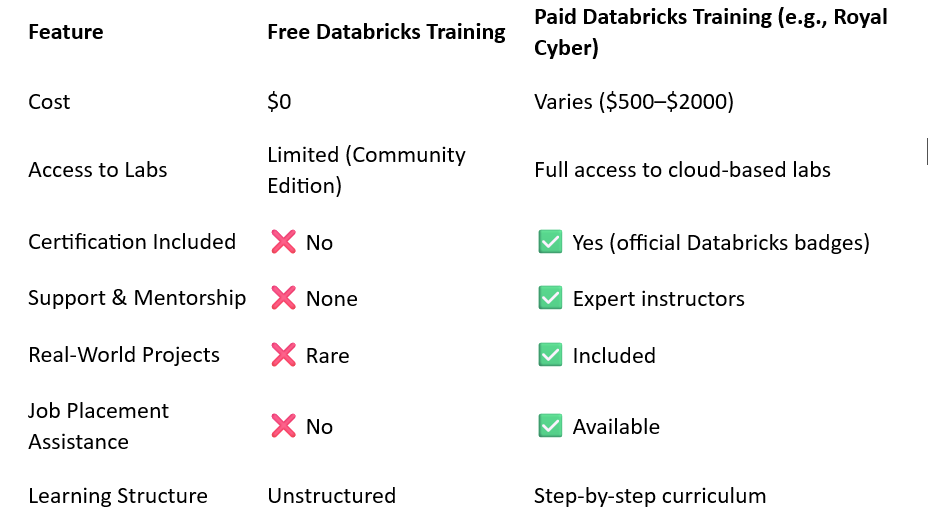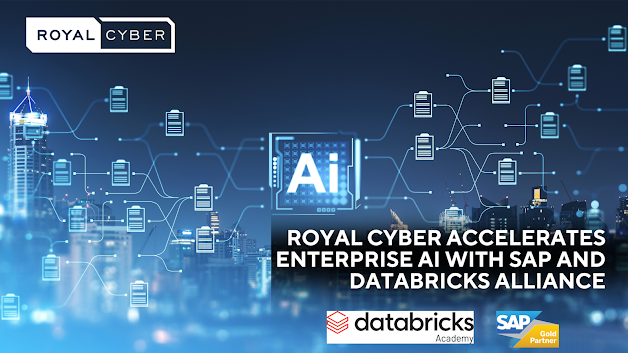Free vs. Paid Databricks Training in 2025: Which One Boosts Your Career Faster?
Why Databricks Training Matters in 2025
In a world powered by data and AI, Databricks has become the backbone of scalable analytics and machine learning across cloud platforms like AWS, Azure, and GCP.
Whether you’re a developer, a data engineer, or an enterprise team leader, investing in Databricks training can unlock:
- 📈 Career Growth: Certified professionals earn up to 40% more.
- ☁️ Cloud-Native Expertise: Databricks is the engine behind many enterprise data lakes and Lakehouse platforms.
- 🧠 Skills That Scale: From Apache Spark to AI workloads, Databricks powers modern analytics stacks.
But the big question is: Should you choose free Databricks courses or invest in paid training?
Let’s break it down.
🆓 Free Databricks Courses: Pros & Cons
✅ Pros of Free Training
- Zero Cost
Ideal for beginners exploring Databricks without financial risk. - Official Resources
Access Databricks Academy, Community Edition, and free notebooks. - Self-Paced Learning
Flexible and beginner-friendly for self-learners.
❌ Cons of Free Training
- Limited Depth
Most free courses only cover basics — advanced topics, enterprise use cases, and best practices are often missing. - No Certification
Lacks industry-recognized credentials that boost hiring potential. - No Mentorship
You’re on your own. No instructors to help with challenges or clarify concepts.
💼 Paid Databricks Training: Pros & Cons
✅ Pros of Paid Training
- Structured Learning Paths
Programs like Royal Cyber’s Databricks Certification Training take you from beginner to advanced — step by step. - Certifications That Matter
Get recognized credentials like Databricks Certified Associate/Professional badges. - Real-World Projects
Work on hands-on labs with real datasets and enterprise scenarios. - Expert-Led Support
Learn from certified trainers and get mentorship, Q&A, and career guidance. - Job Placement Assistance
Some premium programs (e.g., Royal Cyber) offer career services and corporate job referrals.
❌ Cons of Paid Training
- Upfront Cost
Paid programs require investment, but ROI is high with better job outcomes.
Time Commitment
Some instructor-led sessions follow fixed schedules.
📊 Free vs. Paid Training Comparison

Who Should Choose What?
🟢 Free Training is Best For:
- Beginners exploring the platform.
- Self-motivated learners on a budget.
- People testing Databricks before full commitment.
🔵 Paid Training is Best For:
- Professionals aiming for Databricks certifications.
- Businesses upskilling teams for data transformation projects.
- Developers targeting high-paying roles in big data, cloud, or AI.
🌟 Why Choose Royal Cyber for Databricks Training?
Royal Cyber offers one of the most comprehensive Databricks training programs in the market:
- ✅ Instructor-Led Training
- 🧪 Hands-on Labs with Real-World Data
- 📜 Official Certifications
- 🏢 Enterprise-Grade Team Training
- 🎯 Placement Assistance & Mentoring
👉 Explore Our Databricks Certification Programs
📞 Contact Us for a free consultation.
❓ Frequently Asked Questions
1. Are free Databricks courses enough to get a job?
Free training covers basics, but certification and project experience from paid courses are essential for job readiness.
2. What does Databricks certification training cost?
Costs vary, but Royal Cyber offers competitive rates and flexible payment options.
3. Can businesses benefit from Databricks training?
Absolutely. Customized enterprise training accelerates cloud adoption and data maturity.
4. How long does it take to learn Databricks?
You can become job-ready in 8–12 weeks with a structured, guided curriculum.


.png)

Comments
Post a Comment